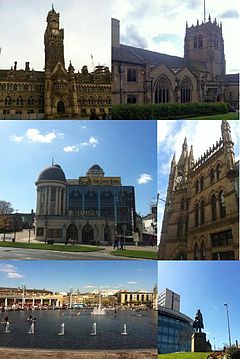Bradford, West Yorkshire
| Bradford | |
|---|---|
 City Hall, Bradford Cathedral, The Alhambra Theatre, The Wool Exchange, City Park, The National Media Museum |
|
 Coat of arms of Bradford |
|
| Bradford shown within West Yorkshire | |
| Area | 24.85 sq mi (64.4 km2) |
| Population | 528,155 |
| • Density | 8,981/sq mi (3,468/km2) |
| OS grid reference | SE163329 |
| • London | 174 mi (280 km) S |
| Metropolitan borough | |
| Metropolitan county | |
| Region | |
| Country | England |
| Sovereign state | United Kingdom |
| Post town | BRADFORD |
| Postcode district | BD1-BD15 |
| Dialling code | 01274 |
| Police | West Yorkshire |
| Fire | West Yorkshire |
| Ambulance | Yorkshire |
| EU Parliament | Yorkshire and the Humber |
| UK Parliament | |
Bradford ![]() i/ˈbrædfərd/ is in the Metropolitan Borough of the City of Bradford in West Yorkshire, England, in the foothills of the Pennines 8.6 miles (14 km) west of Leeds, and 16 miles (26 km) northwest of Wakefield. Bradford became a municipal borough in 1847, and received its charter as a city in 1897. Following local government reform in 1974, city status was bestowed upon the wider metropolitan borough.
i/ˈbrædfərd/ is in the Metropolitan Borough of the City of Bradford in West Yorkshire, England, in the foothills of the Pennines 8.6 miles (14 km) west of Leeds, and 16 miles (26 km) northwest of Wakefield. Bradford became a municipal borough in 1847, and received its charter as a city in 1897. Following local government reform in 1974, city status was bestowed upon the wider metropolitan borough.
Bradford forms part of the West Yorkshire Urban Area conurbation which in 2001 had a population of 1.5 million and it is the fourth largest urban area in the United Kingdom with the Bradford subdivision of the aforementioned urban area having a population of 528,155.
Historically a part of the West Riding of Yorkshire, Bradford rose to prominence during the 19th century as an international centre of textile manufacture, particularly wool. It was a boomtown of the Industrial Revolution, and amongst the earliest industrialised settlements, rapidly becoming the "wool capital of the world". The area's access to a supply of coal, iron ore and soft water facilitated the growth of Bradford's manufacturing base, which, as textile manufacture grew, led to an explosion in population and was a stimulus to civic investment; Bradford has a large amount of listed Victorian architecture including the grand Italianate City Hall.
...
Wikipedia

